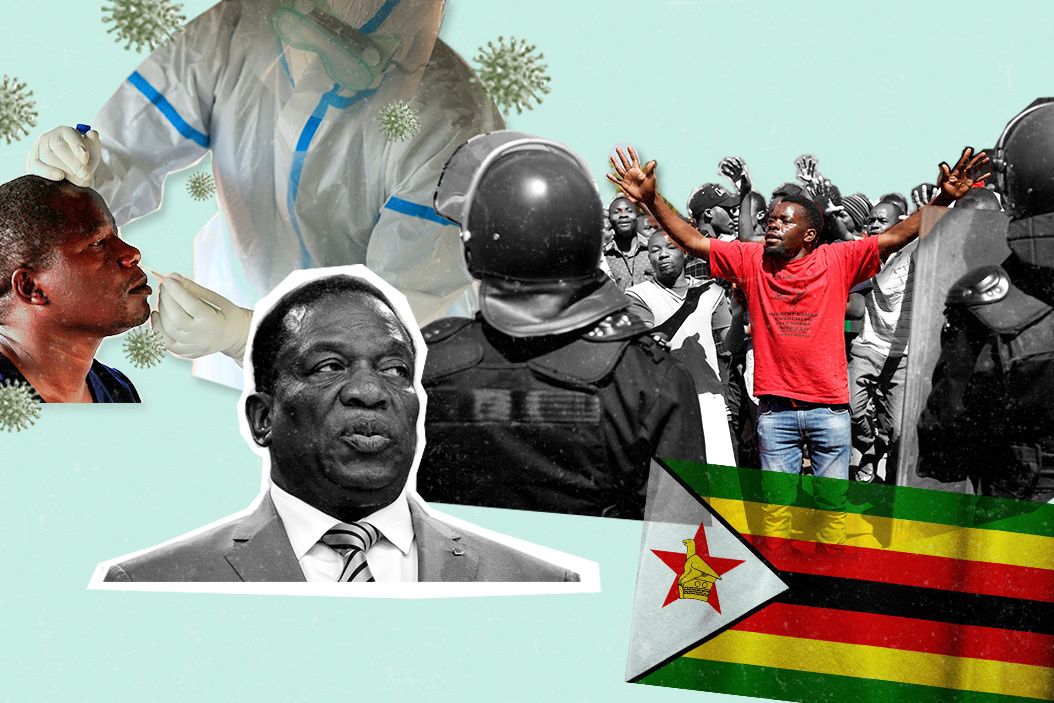August 03, 2020
In late 2017, Zimbabwe's long-serving strongman Robert Mugabe was deposed by the army after 37 years in power. Amid huge popular celebrations, he handed over the reins to Emmerson Mnangagwa, his former spy chief. It was an extraordinary turn of history: Mugabe, one of Africa's last "Big Men" and a hero of the struggle to end white minority rule, went out with barely a whimper, placing Zimbabwe — stricken by economic ruin and international isolation — in the hands of "The Crocodile."
Mugabe has since died, but almost three years after his departure, Zimbabwe's woes continue.
Last Friday, Mnangagwa's security forces swept clean the capital, Harare, ahead of a planned anti-government rally. Mnangagwa warned that anyone involved in what he called an "insurrection" would be dealt with Mugabe-style: rounded up and jailed. The few activists who defied the order ended up behind bars, including prominent local author and Booker Prize nominee Tsitsi Dangarembga.
Here's why protesters in Zimbabwe are fed up these days.
Political repression. Scores of dissidents have been killed by the security forces since Mnangagwa was formally elected in 2018, in a vote which the opposition claims was rigged. Recently arrested journalists and opposition leaders face up to ten years in prison if found guilty of inciting people to participate in public violence.
Corruption. Mugabe's regime was riddled with graft, but things haven't gotten much better since he left. The latest scandal involves a health minister who was caught inflating the cost of pandemic-related medical supplies; he was fired, but the journalist who exposed the scandal was imprisoned.
Inflation. Inflation is running at 737 percent at the moment, as the government prints money to cover expenses. Granted, that's a far cry from the November 2008, when prices rose annually at a world-record 89.7 sextillion percent (that's twenty zeros), but it's still enough to evaporate salaries and pensions.
COVID-19. Zimbabwe's frail health system has collapsed during the coronavirus pandemic. Doctors have sued the government over their lack of access to personal protective equipment, and nurses have gone on strike until they get paid in US dollars. Last week, staff shortages at one of Harare's major hospitals resulted in seven stillborn babies in one night. Instead of hiring more health workers, the government has arrested more than 100,000 people for violating lockdown orders.
Food security. The UN says six in ten Zimbabweans are on the brink of starvation due to the combined effects of severe droughts, economic crisis, and the pandemic. Subsistence farmers, responsible for three quarters of the country's food supply, have produced less than half of Zimbabwe's annual maize requirement this year. Mnangagwa's "response" has been to pay $3.5 billion to white farmers whose land was expropriated and left idle, which dramatically decreased Zimbabwe's once-sizable agricultural output.
As popular anger grows in Zimbabwe, the country's plight offers a sobering lesson: removing a dictator doesn't necessarily make things better — particularly if his system and his cronies remain in power. Will ordinary Zimbabweans, who were too afraid to rise up in large numbers against Mugabe, soon feel they have nothing to lose in standing up to his successor? And will Mnangagwa be able to keep them quiet much longer?
More For You
How is the US is reshaping global power dynamics, using tariffs and unilateral action to challenge the international order it once led? Michael Froman joins Ian Bremmer on GZERO World to discuss.
Most Popular
- YouTube
In this Quick Take from Munich, Ian Bremmer examines the state of the transatlantic alliance as the 62nd Munich Security Conference concludes.
- YouTube
At the 2026 Munich Security Conference, Brad Smith announces the launch of the Trusted Tech Alliance, a coalition of global technology leaders, including Microsoft, committing to secure cross-border tech flows, ethical governance, and stronger data protections.
When the US shift from defending the postwar rules-based order to challenging it, what kind of global system emerges? CFR President Michael Froman joins Ian Bremmer on the GZERO World Podcast to discuss the global order under Trump's second term.
© 2025 GZERO Media. All Rights Reserved | A Eurasia Group media company.
